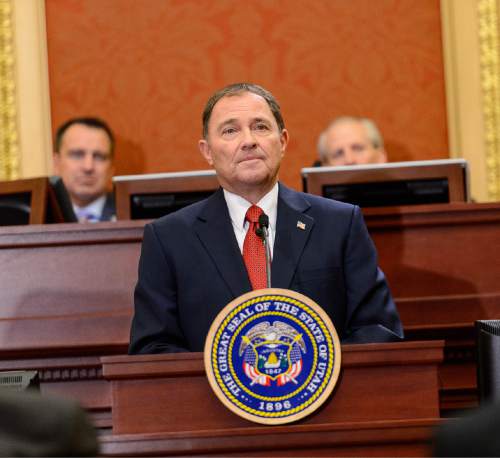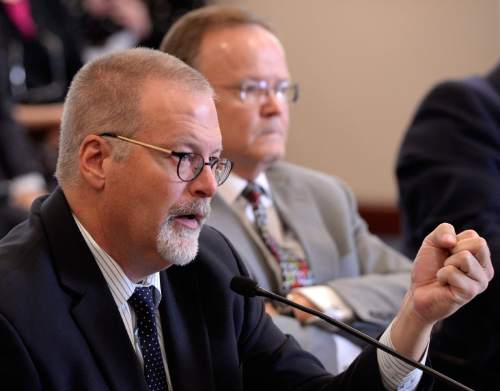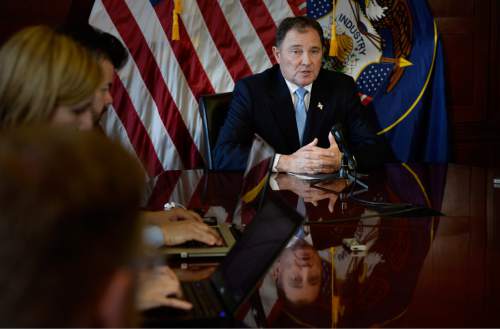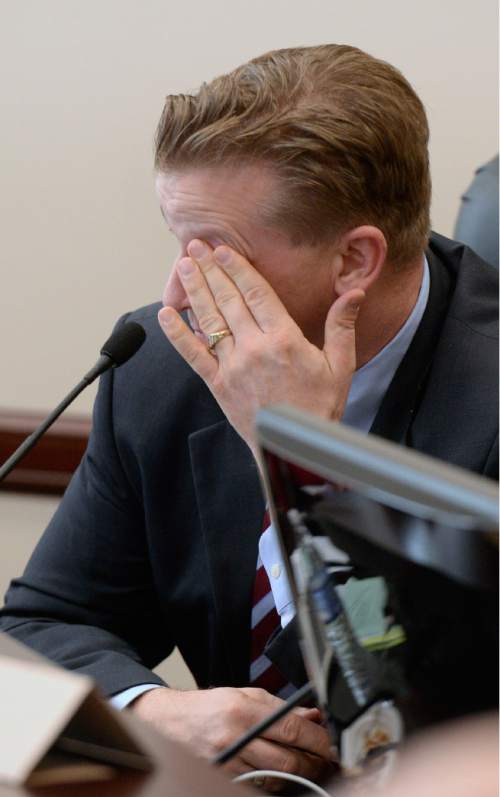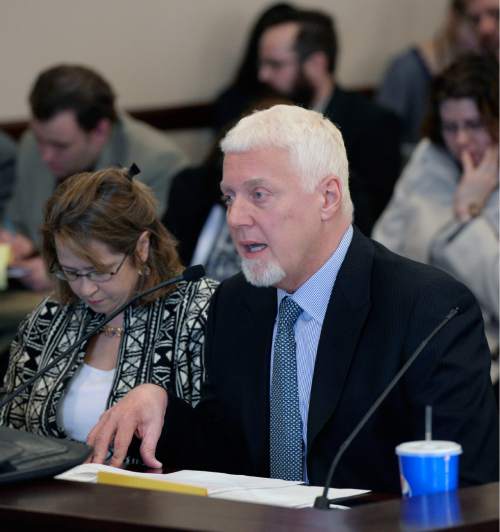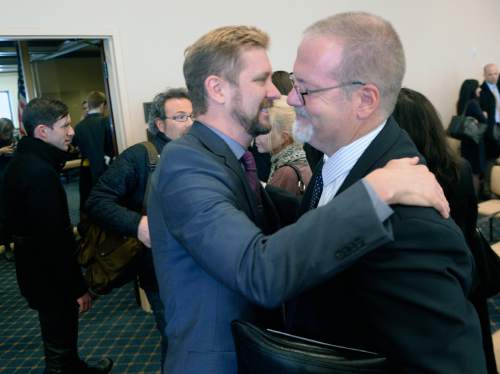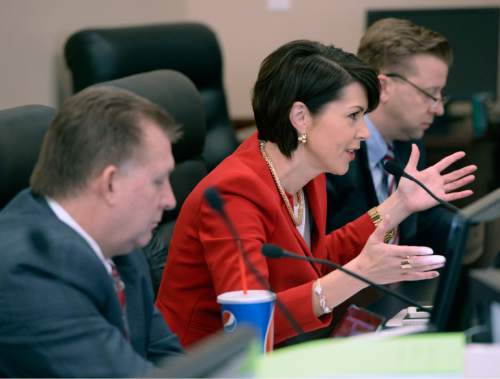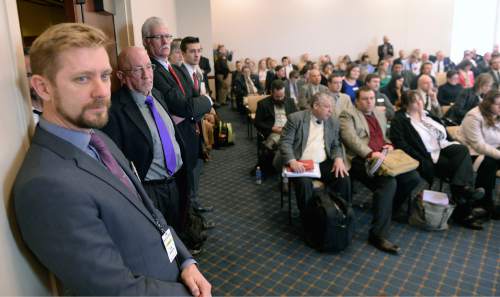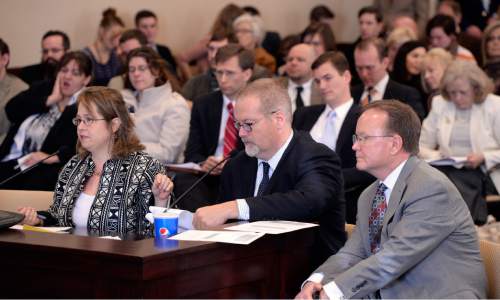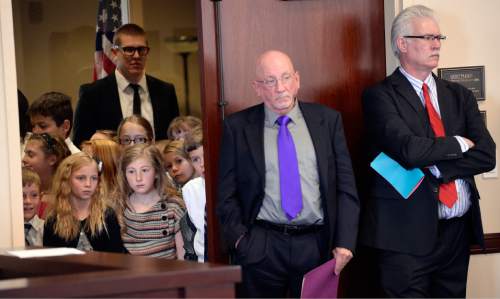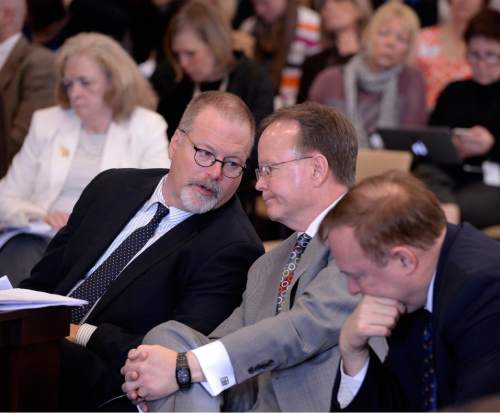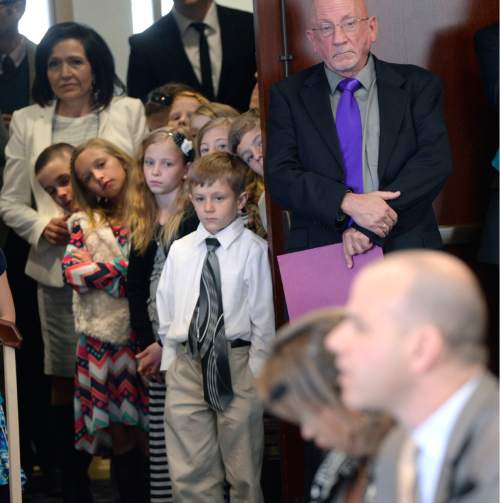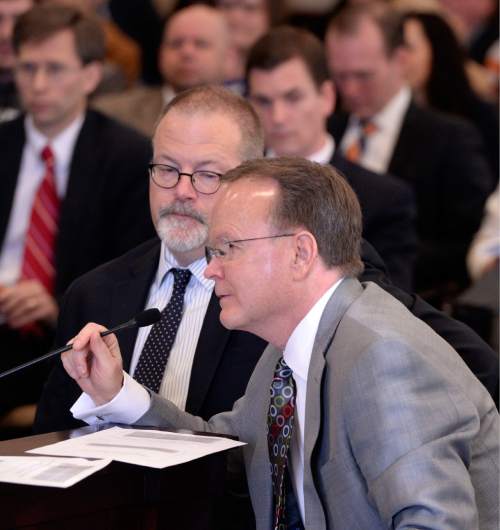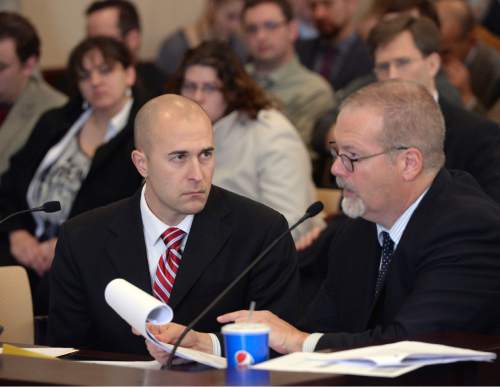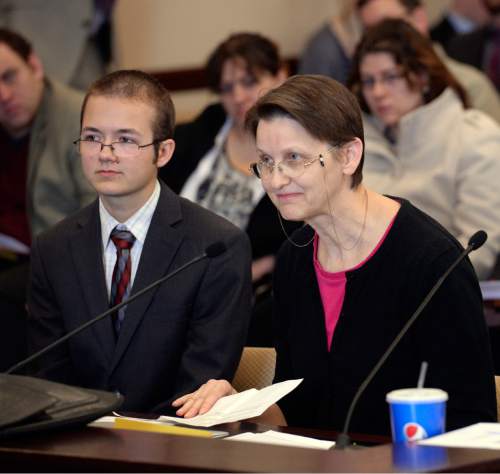This is an archived article that was published on sltrib.com in 2015, and information in the article may be outdated. It is provided only for personal research purposes and may not be reprinted.
A trailblazing bill that seeks to balance gay rights and religious freedoms sailed through a Republican-controlled Senate committee in a unanimous vote Thursday before earning a promise from Gov. Gary Herbert that he would sign the measure.
"I think it is a historical day and I think the House and Senate and the folks involved in this have worked very hard," Herbert said.
SB296 — endorsed by the LDS Church and gay-advocacy groups — is a compromise that grew out of seven years of legislative debate and, more recently, weeks of backroom negotiations involving lawmakers, gay advocates and Mormon officials — all of whom stood side by side when the legislation was unveiled this week.
The historic nature of that alliance wasn't lost on Sen. Todd Weiler, R-Woods Cross, who said his own understanding about lesbian, gay, bisexual and transgender rights and had evolved.
"I'm not in the same place that I was a year ago, where I was two years ago. … This is a paradigm shift for many," said Weiler, noting his own conservative Mormon background.
Weiler said he wasn't convinced that LGBT Utahns experienced widespread discrimination, but said the bill's passage would carry an important message.
"It sends a message to thousands of young people who are struggling with their identity, who are …. " he said, pausing to steady himself and wipe away a tear, " … struggling with whether they want to stay alive. I think it sends a very important message that they play a role in our society."
Sponsored by Sens. Stuart Adams, R-Layton, and Steve Urquhart, R-St. George, the bill nows heads to the full Senate for debate after the chamber's Business and Labor Committee cleared it in a 7-0 vote.
"We're ecstatic," said Equality Utah Executive Director Troy Williams, who last year was among 13 activists arrested while trying to force lawmakers to hear a nondiscrimination bill. "To have Republican legislators voting alongside Democratic senators to advance the rights of gay and transgender individuals who live and work in this state, it was beautiful."
If it becomes law, SB296 would make it unlawful for employers and landlords to discriminate against individuals based on their sexual orientation or gender identity. Religious organizations and their affiliates would be exempt from the bill's requirements.
"I think people are going to be happy on probably both sides," Herbert said Thursday. "That's maybe the definition of a good compromise."
The Republican governor said the measure is "a good model for the rest of the country," adding, "I'm going to sign the bill."
But SB296 could face a challenge from Rep. LaVar Christensen's HB322.
The Draper Republican's proposal would give individuals, "closely held businesses," religious institutions or their affiliates the right to refuse to provide services if it would violate their religious beliefs. And it would allow religious freedom to be used as a defense in civil or governmental claims of discrimination.
The exemptions for religious freedom in SB296 were concessions to the state's predominant faith, The Church of Jesus Christ of Latter-day Saints, after senior Mormon leaders said they would support a statewide nondiscrimination bill if it provided protections for religious expressions and the exercise of faith.
In 2009, the LDS Church endorsed two Salt Lake City ordinances barring housing and job discrimination based on sexual orientation or gender identity. It marked the only time — until this week with SB296 — that the Utah-based faith had endorsed specific, pro-gay-rights legislation.
Nearly 20 Utah cities and counties have passed similar nondiscrimination ordinances.
Proposals for a statewide nondiscrimination law have failed in each of the past six years.
But on Wednesday, L. Tom Perry, second in line for the LDS Church's presidency, joined fellow apostle D. Todd Christofferson and Neill Marriott, second counselor in the faith's Young Women general presidency, at Utah's Capitol Hill to endorse SB296.
That high-profile news conference gave the nondiscrimination effort a profound push, especially in a Utah Legislature dominated by Mormons.
Williams said he doesn't know why LDS leaders have chosen to support a statewide bill this year, but he believes the persistent efforts by LGBT individuals to share their personal stories of struggle have helped to illuminate inequities and soften hearts.
"There are many gay, lesbian and transgender Latter-day Saints, and every family in America has some LGBT relatives somewhere on their family tree," said Williams, who was reared Mormon and served a full-time LDS mission. "We're in every facet of society, every political party, every social class and people are starting to let go of the fear and get to know us. When that happens, hearts and minds open, fear and mistrust dissipate."
Not all who spoke during Thursday's two-hour hearing shared Williams' view of an empathetic and accepting Utah. Among the dozen bill opponents were some who railed against gay sex and said the measure worked against the "law of God," giving gays license to recruit youths and force schools to teach homosexual sex in classrooms.
Others questioned the scope or existence of discrimination problems and worried that SB296, which had been public for less than a day at the time of the hearing, was moving too fast.
Support came from the American Civil Liberties Union, families of gay and transgender children, and business leaders from eBay and CHG Healthcare Services.
They warned the committee that Utah's growing, global reputation as a great place for business could be harmed if SB296 fails, because companies wouldn't want to leave employees vulnerable to discrimination without legal protections.
"Utah businesses will find themselves at a competitive disadvantage," CHG's CEO Michael Weinholtz said, if lawmakers reject the nondiscrimination measure.
SB296 specifically exempts the Boy Scouts of America, leaning on a 2000 U.S. Supreme Court decision that declared the Scouts could not be forced to hire gay leaders.
It also does not deal with "public accommodations" such as bakers and photographers or other commercial service providers.
Weiler said he has heard some private grousing from those who wonder why the LDS Church is "opting out" of SB296's proposed prohibitions, even as it states its support for the bill, and asked University of Illinois law professor Robin Fretwell Wilson to help him understand the conundrum.
Wilson, an expert in religious liberty who helped draft the bill, said it's important that religious institutions be allowed to maintain their core beliefs.
"Religious organizations need do what they do, to do the good that they do in the world," she said. "They need to be able to maintain faith communities and to have that unique religious character."
Wilson called SB296 a first-in-the nation proposal, which was remarkably born in the wake of court rulings legalizing same-sex marriage. That could have deepened the divide between LGBT and religious interests in Utah, she said, but instead the sides have worked together.
"This bill is nothing if not historic," Wilson said. "It calls a truce, in effect, in a social war that has pitted gay rights against religious liberty."
Robert Gehrke contributed to this report.


